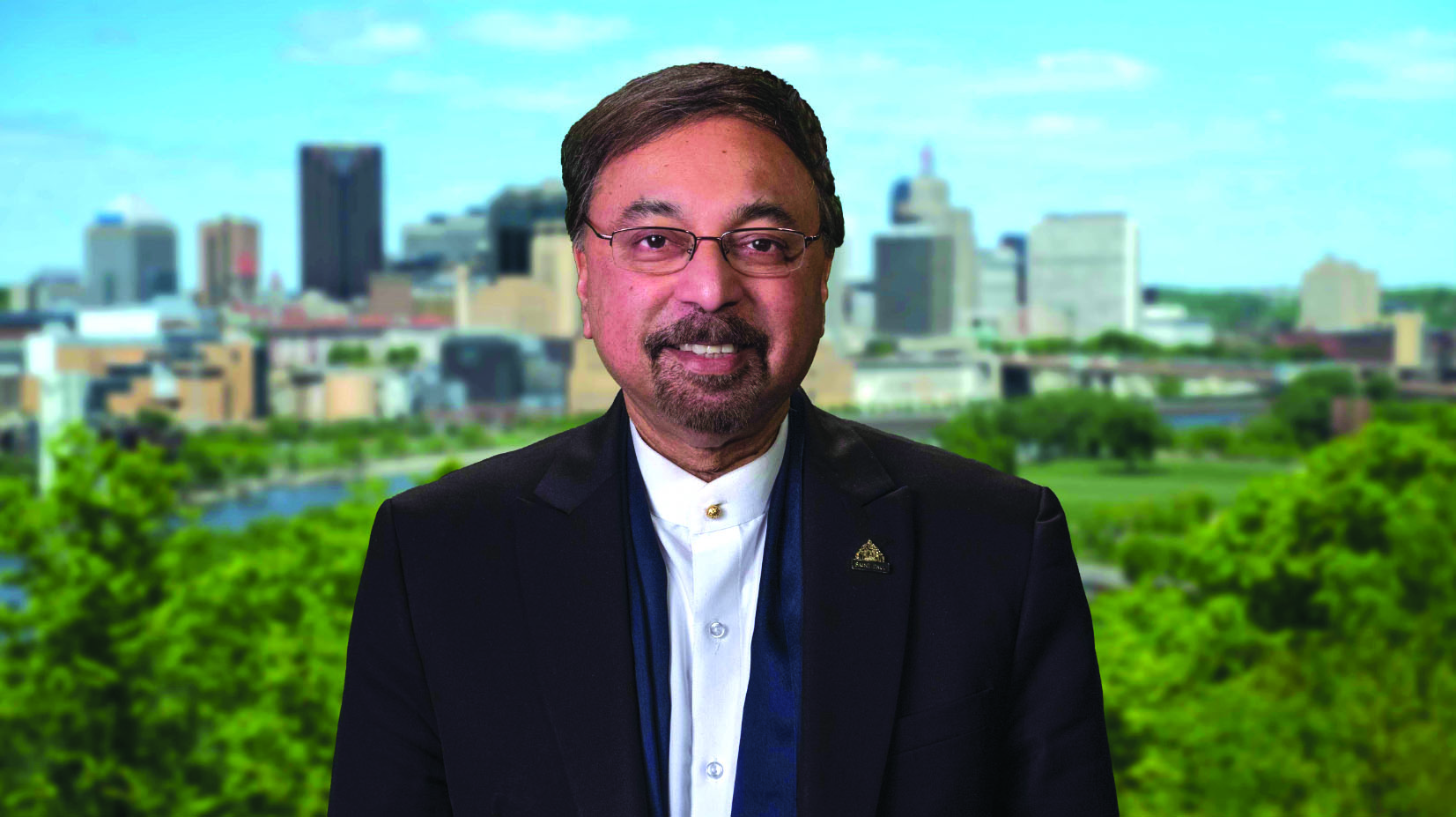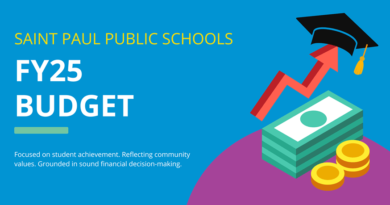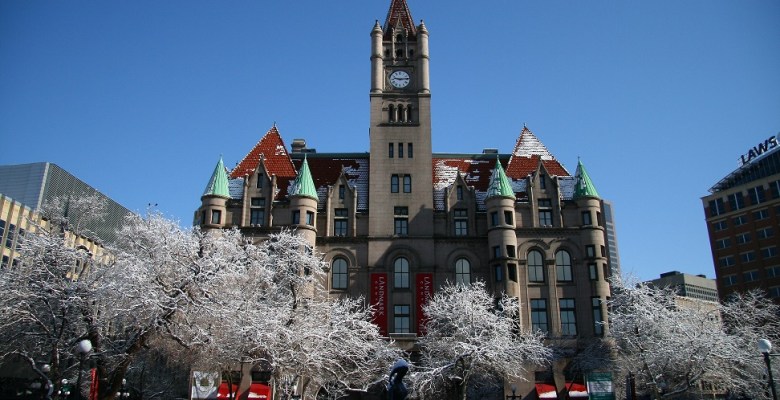Reaching the People through Economic Development
by John Hottinger
Dr. Bruce Corrie, the City of St. Paul’s Planning and Economic Development Director, brings a rich and varied background which fits with Mayor Melvin Carter’s outlined agenda for economic development. His work on ethnic entrepreneurship has helped the development of policies and programs to tap this rapidly growing base to bring jobs and economic revitalization across Minnesota. He has a doctorate in economics from the University of Notre Dame. The Mayor has highlighted goals of increasing the number of jobs in St. Paul and increasing access to jobs and opportunity for residents; growing St. Paul’s tax base to maintain and expand City services, amenities and infrastructure; and lowering unemployment among the City’s diverse populations with disproportionately high unemployment rates.
Teacher, Dean and administrator at Concordia University, he worked to build community and governmental relationships for the university and helped develop its international programs.
His research on the economic contributions of immigrants and minorities has been featured in national and local media and fits closely with his recognition of the opportunities of those assets for St. Paul’s future.
Dr. Corrie said he was “excited” to be appointed by the Mayor to serve the City, especially since the Mayor’s policy vision is to “deepen the impact of our economic development efforts such as to reach people at very low-income levels and at the same time to widen the impacts so it includes everybody. In everything we do, how deep can we go, how wide can we get.”
Dr. Corrie points out that the mission is “to build community wealth through jobs, business, housing, planning, cultural assets and financial assets.” Much of his research and work has featured an approach using verified data to highlight the “ethnic capital” of immigrant and Native American communities with a focus on what assets they bring in terms of workers, additional cultural perspectives and artistry, consumers, entrepreneurs, trade networks, politics, volunteers, and tax base growth.
His Planning and Economic Development Department has plans to evolve existing strategies that focus on improved, affordable housing, making St. Paul more responsive to business licensing and attraction and focusing on cultural centers.
Existing Cultural Centers: He believes that working with the already-existing cultural assets and ethnic communities in the City will help the creation of destination places that can spur tourism and the infrastructure of a global city with diverse attractions. He believes the approach can grow jobs, income and wealth in those communities.
Local Business Nodes: Locally-centered economies with new and existing businesses are the way to start one of the business nodes, according to Dr. Corrie. Even with such driving large-scale developments like Keg-and-Case on Seventh Street, which is off to a very strong start, he contends that there should be a way to grow the adjacent areas with additional retail and other local shops to help drive the community success and wealth from the attraction.
Growing Tech-based Sector: Another initiative of the City is to seek a more tech-based manufacturing sector. It is headed by a “harnessing a task force of collected-talent to build the vision of a tech-based cluster in downtown St. Paul and in the City.” They are actively helping in “marketing, promoting and building out that vision.” At the same time, the city continues to urge small business and new business through improving services and putting the City on the map as seeking technology businesses. The effort is co-chaired by Mayor Carter and Securian CEO Chris Hilger and includes City Councilmember Chris Tolbert.
Affordable Housing: Another key goal is the establishment and funding of the Mayor’s proposed Housing Trust Fund for production, preservation and protection of affordable housing. “We are going to be paying a lot of attention to that because the need is great.” He notes that building new housing won’t be enough because of the many low-income people seeking it. Instead, the wealth-building envisioned under the Mayor’s variety of proposals is a necessary part of the solution leading to access and family stability.
The changes in these approaches impact established neighborhoods. They will create “cultural anxiety and economic anxiety. We can address those through our actions by showing people we are a welcoming community”, Dr. Corrie said. “The Mayor talks in terms of ‘place-making,’ which means people coming together to discover each other. We tell each other our stories and around those stories commercial activity can happen, entertainment can happen, social activity can happen, but as we do that we start to discover that the ‘other’ is not an enemy, the ‘other’ might be different but there is a way we can work together and build something together.”
In the end, Dr. Corrie said in order for these visions to come true, “We’ve got to act; we’ve got to be intentional in our focus on outcomes, to start slowly showing outcomes that progress is occurring, and that people are benefiting.”
On the Right Track
As we continue to enjoy the sunshine and all the great festivals and events happening throughout our City this summer, we’re also seeing our youth out and about throughout our neighborhoods enjoying the same. Many are also participating in activities at our Rec Centers and libraries, and are working in our community businesses.
For some students, summer presents an opportunity, often their first, to explore meaningful training and career exploration. Summer internships are a chance for our youth to obtain employment in a meaningful way that helps prepare them for the workforce as adults. Similarly, it allows businesses to train youth to become future adult employees in sectors that need skilled workers.
Not all students have traditionally been able to access and benefit from such meaningful internship opportunities, however, which is why I worked with the Council and administration on the creation of Right Track, a public-private partnership that brings together the City, the St. Paul Public Schools, local businesses, and community-based organizations to provide professional internships and skills training for youth in our City.
Right Track has proven to be a successful endeavor to provide youth with meaningful work and training to succeed in the workplace. Last year alone youth were placed in more than 100 different organizations for summer employment and work readiness training. Over 800 youth were matched with jobs and earned over a million dollars in wages. Additionally, over 200 youth had professional internships and earned Northstar Digital Literacy Certificates.
The training Right Track youth receive includes things such as resumé-building, interviewing skills, explanation of payroll process (such as filling out a W-4), digital literacy, public speaking, budgeting, and professional networking. These are skills our youth will benefit from as they enter the workforce as adults.
The success of Right Track wouldn’t happen without our partnerships with community-based organizations and east metro businesses. If you’re interested in hosting a Right Track summer employee, reach out to us at 651-266-6363 or RightTrack@ci.stpaul.mn.us.



